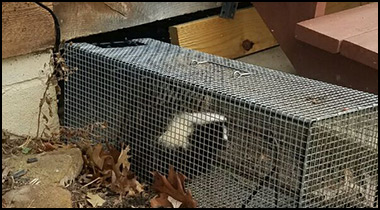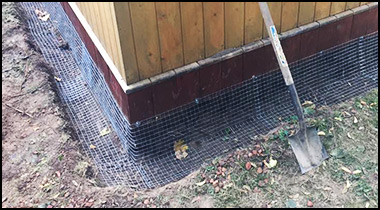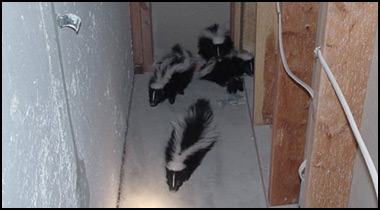San Jose Skunk Removal Resources
Skunk Rehabber - Wildlife Center of Silicon Valley: (408) 929-9453
Free Santa Clara County Animal Services: 408-465-2920
Humane Wildlife Trappers of San Jose: 408-550-6660
If you need skunk control in San Jose, you have a few options. First, you can attempt to solve the skunk problem yourself by reading our do-it-yourself guide. If you need outside help, you can also call Santa Clara County Animal Services to see if they have any free resources or help for you - however, they primarily deal with dog and cat concerns. You can also call a local San Jose wildlife rehabber, as they are typically a great resource for advice that is in the best welfare of the animal. If as a last resort you must hire a professional company, we recommend Humane Wildlife Trappers of San Jose at 408-550-6660. To learn more about them or check their skunk removal prices, visit sanjosepestanimal.com.

San Jose Skunk Trapping and Removal

Preventative Repairs & Exclusion

San Jose Skunk Removal From Structures
In many cases, preventative measures can solve your San Jose skunk problem - keep garbage secured, pet food indoors, and most of all when it comes to skunks, secure the perimeter of your shed, porch, deck, or house with a barrier - lattice or steel mesh is good, and it keeps California skunks from going under the structure. If trapping and removal of the skunk is the only option you have, please do so with the help of a local agency or professional company who knows how to do it humanely and legally. Browse the resources of this site for more educational information.
Frequently Asked Questions:
Prevention: How to Keep Skunks Away
What to do with a skunk after I catch it?
Is it legal for me to trap a skunk?
How to remove skunk odor
Is a skunk active during the daytime rabid?
What does skunk feces look like?
San Jose Skunk Control Information: Do all skunks have rabies?
All mammals, Such as a skunk, can contract rabies if they are bitten by a rabid animal. Most other wild animals avoid skunks because of their noxious and often stinging spray, so this substantially lowers the odds that they will contract the disease. Rabies, also known as Lyssavirus, is a dangerous and contagious disease that attacks an infected animal's central nervous system It's transmitted through an animal's saliva in the diseases final stage, before death. This stage is known as when the creature is shedding the virus. Rabies cannot be transmitted through bodily fluids like blood or urine, and is not found in the infected animals feces. It is not an airborne contagion either. Because it adversely affects your central nervous system, rabid animals usually behave in a very abnormal manner. Their behavior depends on the stage of the disease they are in.
In the earliest stages there are slight signs of CNS (central nervous system) failure. The animal may appear wobbly or dizzy. It may even appear drunk. These can also be signs of other diseases or poisoning as well. As it progresses it becomes evident it is rabies.
The "furious" stage- They animal may appear agitated to onlookers. It may even seem to snap or attack imaginary object. The animal may also drool excessively, or seem "out of it".
The "dumb" stage- The animal becomes calm and at times even the wildest of animals may appear tame. They show no fear of people or other animals.
Even though the instance of a skunk contracting rabies might be low, If any typically nocturnal (night dwelling) animal becomes highly active during daylight just observe them. Being out in the day light DOES NOT mean they are rabid. It they are acting out and exhibiting really abnormal behavior, stay away from the animal. Keep your pets and others away from it as well. You should immediately contact animal control, or call a wildlife agency.
Remember, for free services you can try (408) 929-9453 or 408-465-2920, but if you need to pay for professional help, check the prices at the sanjosepestanimal.com website. Or follow our do-it-yourself guide!

